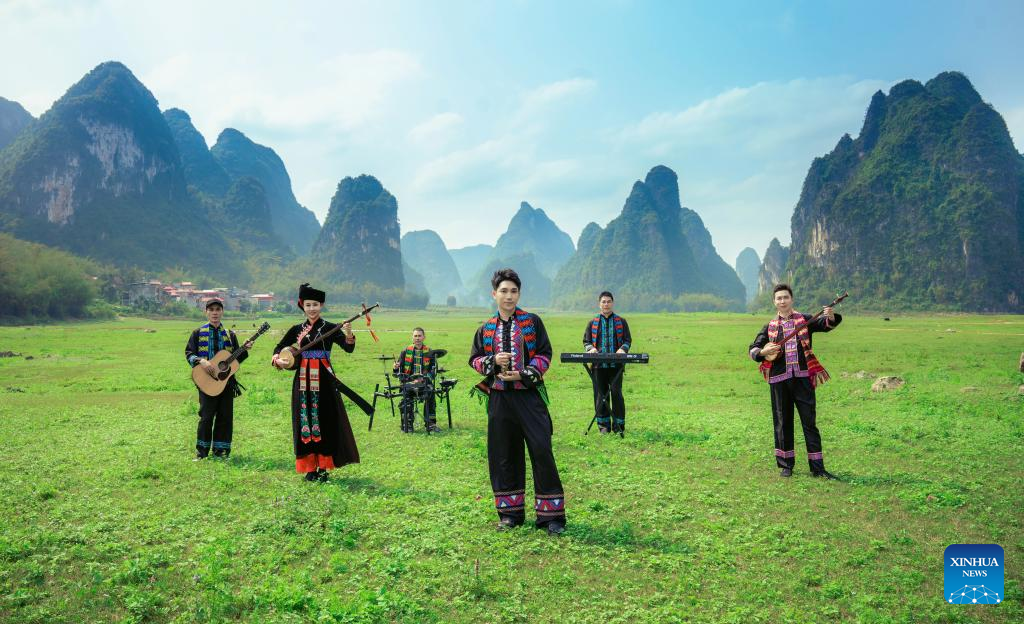Amateur musicians revive Zhuang ethnic instrument with pop music
From:XinhuaAuthor: 2024-08-08 14:35

Dingding band records a music video at Jinlong Reservoir in Longzhou county, in the city of Chongzuo, south China's Guangxi Zhuang Autonomous Region, March 25, 2024.(Guangxi Longzhou County Integrated Media Center/Handout via Xinhua)
In a scenic spot nestled among the verdant karst hills of south China's Guangxi Zhuang Autonomous Region, a band of five men and a woman are putting on a pop concert, dressed in embroidered ethnic costumes.
These amateur musicians of the Zhuang ethnic group are playing not only modern-day guitars, a keyboard and a drum kit, but also a couple of two-stringed Tianqin zithers, made from gourds and played like guitars.
The Tianqin, literally meaning heavenly zither, was originally played by the Zhuang people as a ritual instrument, together with the chanting of good wishes. The instrument is currently experiencing a revival, with musicians making renewed efforts to woo young audiences. The six-member pop band, named Dingding, serves as the latest example.
The six members, aged between 31 and 48, consist of three school teachers, a factory worker, a former media worker and a health worker. They live in Longzhou County in the city of Chongzuo, Guangxi, and formed the band last year out of a common enthusiasm for music. They rehearse twice a week and perform publicly in a scenic spot, as the local government strives to promote the art form by combining it with tourism.
The Tianqin art form was included in the national-level intangible cultural heritage list in 2021. Efforts to preserve and revive this artistic treasure of the Zhuang ethnic group have been enormous, including efforts by local authorities to integrate Tianqin performances into primary and secondary school curricula, efforts by art colleges to refine the artistic delivery of the folk instrument, and grass-roots inheritors striving to pass down the authentic Tianqin performances to the next generations.
The six-piece Dingding band takes its name from that of the Tianqin in the Zhuang ethnic language. Apart from fusing the iconic instrument of the Zhuang ethnic group with western instruments, the band also introduces Shan'ge, or "mountain song," a genre of Chinese folk song, into their pop music repertoire.
Traditionally, aside from rituals, the Zhuang people sing Shan'ge ballads while playing the Tianqin. Shan'ge, sung in real-life scenery with improvised or scripted lyrics passed down by word of mouth, is another cultural heritage of the Zhuang ethnic group and a unique allure of Guangxi.
"As the Tianqin is a relatively niche phenomenon, we decided to amplify the unique characteristics of Shan'ge and infuse them with more popular music elements, to make it more appealing to today's young folks," said Lu Qingcong, lead singer of Dingding.
"Lei Ya," one of band's three original songs, features a segment of rap that represents the finger-guessing games at feasts of the Zhuang people. Released in March on several social media platforms, it has won acclaim from net users.
"Although I don't understand the Zhuang language, the song is absolutely fantastic to listen to," wrote a subscriber on the popular social media platform Douyin.
In another original song to celebrate the upcoming inclusion of Longzhou County into the country's bullet-train network, electronic music has been embedded into the song along with notes from the Tianqin.
The novel combination of a traditional instrument and a pop music band has drawn interest from curious viewers. "When we perform at the scenic spot, tourists from outside the region inquire about the playing techniques and even the cost of a Tianqin instrument," said Lu.
Speaking of the difficulties they've encountered in blending the Zhuang language, Tianqin and pop music, Lu said the timbre, frequencies and tones of Tianqin sometimes clash with other instruments.
"We have to do some subtractions," said Lu. "When the Tianqin plays a dominant role in the singing segment, the bass and guitar should give way to the Tianqin."
Qin Yan, one of the two Tianqin players in the band, commented, "In Longzhou County, people are speaking different Zhuang dialects with slight differences in pronunciation from town to town, which requires us to sort out the most fitting pronunciations to rhyme better and sound more natural."
Their new song, which is to be released soon, draws inspiration from their childhood lullabies. "Our summer memories of cattail leaf fans, fireflies and starry nights, together with Zhuang ballads, will all feature in the new song," said Qin.
"We think culture has its 'roots,' which means we cannot create things out of nothing," said Ma Shaogang, another Tianqin player and the band's composer. "Looking forward, we will go on creating pop songs based on the Tianqin and other Zhuang ethnic cultural elements, because that is where we come from, our 'roots'." Enditem
(Liu Jie, Feng Shiqi, Zhang Qingshuo, Li Weixin, Guo Bingqian, Wu Xinni, Shi Peng and Zhong Yi also contributed to the story.)
Edit:董麗娜
The copyright of the article and the picture belongs to the original author. If there is any infringement, please contact to delete it